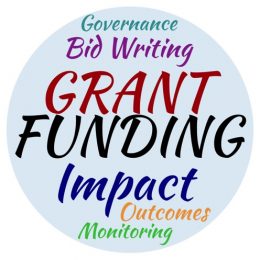 Having looked in Part 3 at how we find potential funders we will now consider how to approach them.
Having looked in Part 3 at how we find potential funders we will now consider how to approach them.
Making the application
In essence this is quite simple – approach them the way they ask you to approach them! Some will ask you to fill in their application form electronically and give you their deadline dates. Others may ask for a 2-page letter with a budget attached, explaining what you want to do and why they should fund you.
Strangely, some applications for quite large amounts of money can be quite  easy to fill in, whilst others for much smaller amounts can be really onerous and time consuming! But normally the greater the amount of funding being sought the greater the amount of detail and consequently time will be needed.
easy to fill in, whilst others for much smaller amounts can be really onerous and time consuming! But normally the greater the amount of funding being sought the greater the amount of detail and consequently time will be needed.
Do take the time to give each application its best chance of success. The competition is high and some funders will not let you re-apply for one or even two years if you are unsuccessful, so don’t waste the opportunity.
Assume nothing
With all applications, it is best to assume no knowledge on the part of the funder, so you must fully describe the need you are addressing, your proposed solution and the beneficial outcomes and impact expected – all within the word count available!
Outside your comfort zone?
What should you do if the thought of asking people for money makes your heart sink and your knees wobble? Try not to take the process too personally. This is obviously more difficult if you are asking someone to fund your own salary! However the reason you are asking is not so you can pay your rent next month (although very helpful!), it’s because you truly believe that what you are doing is making a difference. So focus on your impact and build your confidence by finding out the benefits your project is having on people’s lives, and use these findings to add weight to your applications.
Help them to help you!
Funders often like to get to know a bit about a charity before they receive an application. So don’t be afraid of contacting potential funders by phone or email to introduce yourself. This may also save you time if you find that what you want them to fund doesn’t actually fit well with their current funding priorities.
But before approaching a funder do your homework. Know what you want funding for and how much it is going to cost. Also investigate what they normally fund – and what they don’t. For example:
-
- Are they looking to fund only capital projects?
- Will they fund general running expense/core costs or only specific project costs?
 Core costs
Core costs
It can be difficult to work out if you want core costs or project costs, and even what the difference is. Generally it is much easier to get funding to run a project than it is to get core funding towards running your charity. With a bit of lateral thinking however, it shouldn’t be too difficult to work out how to increase your funding options by looking at your charity in project terms rather than as one overall entity.
Looking at how to become more fundable is what we will be focusing on next time.
